|
|
|
Sort Order |
|
|
|
Items / Page
|
|
|
|
|
|
|
| Srl | Item |
| 1 |
ID:
145026
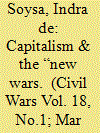

|
|
|
|
|
| Summary/Abstract |
Critics of globalisation suggest that growing free-market conditions generate anomie, leading ultimately to what some term ‘new wars’ and new insecurities. Others argue that liberal economies dissuade violence since people gain from peace. This study argues for a micro perspective that views predatory economic policies driving higher investment in rebellion-specific capital, such as shadow economic activity that easily translates into insurgency in weak-state settings. Investment in the shadows determines survivability against superior state forces, and survivability determines rebellion, by definition. Using civil war onset data from 1970 to 2013, as well as the Global Peace Index (GPI) and several of its individual components, which capture societal insecurity above and beyond the absence of armed violence, this study finds that countries that are more capitalistic have a lower risk of civil war and societal insecurity. The results are robust to alternative models, testing methods, and uphold when examining several relevant subcomponents of the index, such as internal conflict, violent crime, homicides, ease of access to small arms, and political instability. Surprisingly, democracy tends not to be associated with peace but associates with increased criminality whereas strong autocracy reduces it, suggesting that capitalism, more than democracy, associates with conditions favourable to societal security, independently of a country’s level of development.
|
|
|
|
|
|
|
|
|
|
|
|
|
|
|
|
| 2 |
ID:
134451


|
|
|
|
|
| Summary/Abstract |
Structural adjustment programs of the International Monetary Fund (IMF) are often blamed for disrupting social relations by forcing austerity on vulnerable people and introducing unpopular liberalization policies. Some suggest that such interventions harm ethnic relations in developing countries because they are insensitive to the tenuous social bargains that often preserve ethnic peace. Moreover, during crises, dominant groups may seek to displace the pain of reform on others, the ethnic division of labour may be affected differentially by reform policies, and ethnic entrepreneurs could use moments of crisis to their advantage. We test the propositions by using unique data measuring the level of ethnic tensions in a country. The results show that IMF interventions reduce conditions of ethnic enmity. These results are robust to fixed effects estimation, endogeneity and selection effects. Moreover, IMF interventions lower ethnic tension in countries that are highly fractionalized, but they are more problematic where larger groups face each other and when larger groups are excluded from state power. These results suggest too that IMF interventions may lead to greater empowerment of excluded groups who might agitate for change during periods of economic crisis. On balance, IMF interventions, relative to continued economic woe, pacify ethnic relations in crisis-ridden countries. We find no evidence to suggest that IMF programs increase ethnic tensions, which is good news for poor countries requiring cheap loans and assistance with reforms.
|
|
|
|
|
|
|
|
|
|
|
|
|
|
|
|
| 3 |
ID:
182668


|
|
|
|
|
| Summary/Abstract |
This article posits that free-market institutions and practices reduce economic distortions that provide rents for underground organizations, which ultimately form criminogenic environments. Rents from market distortions provide ‘lootable income’ that feeds ‘criminal organizations’, which rely on violence for enforcement of contracts. Using an index of economic freedom, this study contrasts several relevant measures of political freedoms, political discrimination of individuals and groups, and measures of equal access to state ‘goods’ as proxies for political legitimacy and discrimination on the homicide rate. Fixed effects regression results suggest robustly that economic freedom, not political legitimacy, inclusive politics, or state capacity, reduces the homicide rate, results that are stubbornly significant and substantively large. The basic results are robust to a barrage of model specifications, different sample sizes, and estimation strategies, including instrumental variables analysis. The evidence suggests that unusually high homicide rates might be based in quotidian organizational activities related to ‘illegal’ markets rather than to political grievance-based explanations relating to relative deprivation and political legitimacy. Countries wishing to encourage growth-promoting policies need not fear higher levels of interpersonal violence based on various arguments linking free-market policies to societal disarray.
|
|
|
|
|
|
|
|
|
|
|
|
|
|
|
|
| 4 |
ID:
118184
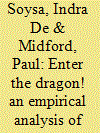

|
|
|
|
|
| Publication |
2012.
|
| Summary/Abstract |
The rise of China has led to a spate of scholarly and journalistic speculation about the future of a liberal world order. Apparently, the rise of a nondemocratic, Asian rival to US hegemony potentially undermines the growth of democracy throughout the system. Many see a resource-hungry China engaging itself globally out of purely self-interested motives, and Chinese business and aid offer a viable alternative to Western influence. Using the Stockholm Institute for Peace Research's (SIPRI) data on arms transfers since the end of the Cold War, we test the proposition empirically by assessing the nature and strength of Chinese politico-military support, measured as conventional arms transfers, globally and to African regimes. In short, we find that China relative to the United States transfers greater amounts of arms to democracies rather than autocracies, whereas the United States seems to prefer more autocratic regimes, despite rhetoric that claims an ethical foreign policy. The same result holds when we assess this relationship using human rights data. Moreover, Chinese arms transfers to countries suffering civil wars are much lower than the United States'. The findings are robust to the inclusion of several control variables and alternative estimation techniques. The findings show that popular perceptions about China's role in Africa do not match reality, particularly when assessed against the current hegemon's behavior.
|
|
|
|
|
|
|
|
|
|
|
|
|
|
|
|
| 5 |
ID:
066357
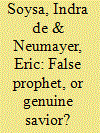

|
|
|
| 6 |
ID:
090136
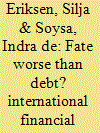

|
|
|
|
|
| Publication |
2009.
|
| Summary/Abstract |
Some report that human rights are likely to be violated when poor countries sign up to structural adjustment programmes (SAPs). These violations apparently occur because ordinary people revolt against the neo-liberal policies that SAPs push. This study examines the effect of the actual flow of finances from the World Bank and the IMF, holding constant all other bank-based financial flows, on government respect for human rights. The authors find that pay-in periods are beneficial for human rights, whereas loan dry-ups correlate with violations. Loan dry-ups are likely to occur because of noncompliance with SAPs rather than implementation, since the international financial institutions (IFIs) release loans in tranches to solve the time inconsistency problem. The overall level of indebtedness is robustly related to human rights abuses, but the higher the stock of debt owed to IFIs relative to total debt, the lower the human rights violations. Accumulating debt to IFIs, thus, seems to improve the level of human rights. Additionally, a higher government consumption to GDP ratio reduces human rights, a result that does not suggest that governments that are capable of commanding a higher share of the country's wealth are less likely to face threatening social dissent. Moreover, a proxy for neo-liberal policies, the index of economic freedom, correlates strongly with better human rights. These results do not square well with the view that neo-liberal policy reforms and the attendant austerity measures drive dangerous dissent.
|
|
|
|
|
|
|
|
|
|
|
|
|
|
|
|
| 7 |
ID:
097767
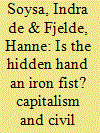

|
|
|
|
|
| Publication |
2010.
|
| Summary/Abstract |
There is surprisingly little empirical scholarship on the spread of capitalistic economic policies under the rubric of 'globalization' and domestic peace. While the classical liberals saw free markets leading to social harmony because of self-interest of individuals, who cooperate for profit, Marxists and others viewed markets as anarchical, requiring state intervention for obtaining justice and peace. The authors argue from an opportunity-cost perspective that the payoffs to rebellion are structured by how an economy is governed. Closed economies are likelier than more open ones to accumulate 'rebellion specific capital' because of high payoffs to organization in the shadows. Using an index of economic freedom that measures how free people are to transact in an economy, the authors find that countries more favorable to free enterprise have a reduced risk of civil war onsets, a result that is robust to the inclusion of institutional quality, per capita wealth, and sundry controls. The results hold up despite a battery of specification changes, alternative data, and testing methods. The findings do not suggest that states under conditions of capitalism lose their autonomy to provide the public good of peace, as skeptics of globalization claim. Peacemakers will do well to build institutions that reward productive investment over rent-seeking, alongside democratic institutions that ultimately gain their legitimacy on the back of good economic performance and well-functioning markets.
|
|
|
|
|
|
|
|
|
|
|
|
|
|
|
|
| 8 |
ID:
079953
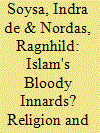

|
|
|
|
|
| Publication |
2007.
|
| Summary/Abstract |
Culturalists claim that political outcomes, such as respect for human rights, are deeply rooted in culture. Some have singled out Islam as particularly problematic. We assess whether Muslim societies suffer higher levels of political terror compared with others. Our results show that countries containing larger shares of Catholics, and those dominated by Catholics, fare the worst. The share of the population Muslim and Membership in the Organization of the Islamic Conference predicts lower levels of political terror. Claims about the uniqueness of Islam for accounting for political repression seem to be exaggerated. Consistent with the findings on religion and democracy, our results indicate that it is the Arab region, not religion that matters, but Latin America shows the largest impact. Substantively, political and economic factors matter a whole lot more than do the variables on religion. This is good news for policy that seeks to end the scourge of political repression.
|
|
|
|
|
|
|
|
|
|
|
|
|
|
|
|
|
|
|
|
|